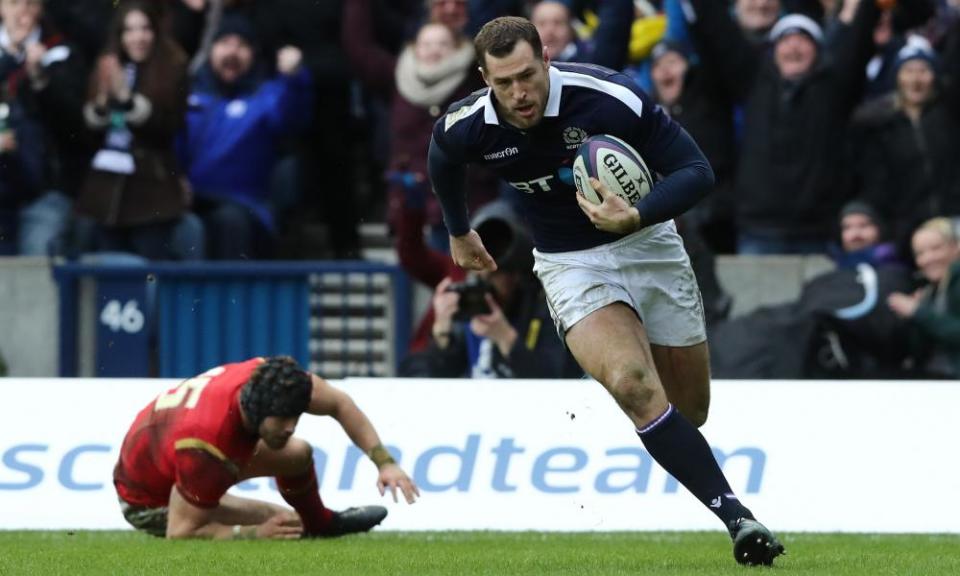Tim Visser seeks end to Scotland’s Twickenham hoodoo after win over Wales

Scotland are dismissing demons right and left and centre but the biggest one is next. “You’re filling me with confidence,” Tim Visser said when the 34-year wait for a victory at Twickenham was put to him. “But with stuff like that you have to break the mould at some point. Why not us? Why not this year?”
Last season Scotland beat France for the first time in eight years and with Saturday’s 29-13 victory they have put behind them a 10-year wait for a win against Wales. Visser scored the match-securing try and laid on the pass for the try that had earlier given Scotland a lead they would never give up.
For a man who used to threaten sporadically his performance of all-round excellence was as emblematic of Scotland’s recent improvement as anyone’s but the best that can be said of Scotland, perhaps, is that such match-defining interventions did not elevate Visser above the throng. There was not a single Scot who did not have a great game.
It came at a price, though. John Hardie became the latest to be ruled out of the championship, going off in the first half with a knee injury. There are doubts, too, over Gordon Reid. But Hardie’s replacement, Hamish Watson, was magnificent. Scotland’s ability to keep performing despite the loss of a number of key players is testament to their growing belief.
As such they travel to Twickenham with as much optimism as they have since the 1990s. “It would be the best result I’ve ever been involved in,” Visser said of the prospect of a win there, “and I’m pretty sure it’s like that for the rest of the team. I wasn’t born the last time we won there. England are easily the best team in the championship and have been so for years. We’ll go down there with a lot of optimism but you have to be realistic. We’ll have to up our game again to get a result down there.”
To be talking about that as if it were a possibility is another measure of how far Scotland have progressed but it needs to be acknowledged, as well, that a defining away win is next on the to-do list. There have been notable away wins in the past few years but the subsequent celebrations have always been accompanied by a twist of disbelief, the mania of the underdog. Now there is a confidence building with each accomplished performance so that victories might soon be a thing to expect.
They suffered the disruption of Hardie’s injury, as well as a first-half try from a scrum that should have been awarded the other way, but they dealt with all of that and the accompanying seven-point deficit by upping their already voracious appetite for work, speed and stardust. Two beautifully worked tries accrued in the second half, of which any team in this championship would be envious, let alone proud. Just as satisfyingly, they kept Wales scoreless in the same period.
The cries of despair from across the Severn will be long and keen. Rob Howley has the air of a man ready with a tin hat. But Wales are not so far off. They looked at one point in the first half as if they were about to cut loose but a naughty little tug by the otherwise superb Rhys Webb denied them what might have been a penalty try. Then Webb was denied himself in the second half by a matter of millimetres, when Visser’s tackle forced a toe into touch as he went for the corner. Compare with Scotland’s first try, when Tommy Seymour touched down a split second before his toe hit the line.
The worry is that downward turns are often preceded by a feeling that “things just aren’t going for you”. It can become a self-fulfilling prophecy. Ask the Scots.
And then there was the curious affair of the kick for touch. Trailing by three early in the second half, Wales were awarded a penalty and Alun Wyn Jones immediately signalled for the posts. But it appears he was talked out of it, confessing as much afterwards. “I would have liked to have [gone for the points] but we didn’t, did we? The kicker didn’t want to, so we went for the corner.”
A mischievous soul might infer from that a deterioration in unity and coherence. If so, Wales have two big games remaining to work on it and on any individual ambitions towards New Zealand this summer. Scotland, meanwhile, have a little demon of their own to shake off.

 Yahoo News
Yahoo News 